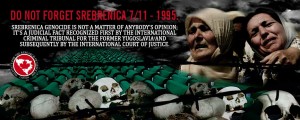April 08, 2015.
STATEMENT ON THE OCCASION OF FOURTH SENTENCE FOR GENOCIDE IN SREBRENICA, BOSNIA AND HERZEGOVINA
Institute for Research of Genocide Canada {IGC} welcomes the final judgment of the Appeals Chamber of the International Criminal Tribunal for the Former Yugoslavia for confirming the first instance verdict of life imprisonment to former General of the Army of the Republic of Srpska, entity Zdravko Tolimir for genocide and other war crimes committed in Srebrenica.
The verdict found proves that the genocide took place in Srebrenica and Bosnia and Herzegovina. Tolimir participated in a joint criminal enterprise of the political, military and police leadership entities Republic of Srpska, whose aims were mass killings and forced removal of Bosnians from Srebrenica, or in eastern Bosnia and Herzegovina. The verdict established there were mass killings of Bosniaks of Srebrenica, also expulsion, abuse and suffering of civilians constituting genocide, because they were aimed at the destruction of Bosnian population.
Genocide in Eastern Bosnia and Herzegovina took place as planned “Directive 7”, signed by the President of the Republic of Srpska entity Radovan Karadzic, who is charged with genocide. This plan was implemented by the commanders of the Army of the Republic of Srpska entities including Tolimir in his intelligence and security sector of the Main Staff. Directive 7 according to the conclusions of the Trial Chamber had the goal of creating impossible conditions in the enclaves, including the stopping of humanitarian aid.
Tolimir was conducted by an order of the President of the entity Republika Srpska Radovan Karadzic and General Ratko Mladic, (accused of war crimes and genocide) that all Bosniaks men from Srebrenica must be executed.
IGC expressed dissatisfaction with the Appeals Chamber that it has removed a part of the judgment of the Trial Chamber, which refers to the judgment of genocide in Žepa, the territory of UN safe area. Violent, perfidious and cowardly murder of three Bosniak leaders in Žepa – Mehmed Hajrić, Amir Imamovic and Avde Palić, and mass killing, expulsion, abuse and suffering of the Bosniks civilians is constituted as genocide, because they were aimed at the destruction of the Bosniak population in the UN protected area of Žepa.
IGC once again reminds us: Genocide, a state-sponsored crime intended to destroy in whole or in part, a national, ethnic, racial or religious group has far-reaching consequences and effects on survivors, future generations and the society as a whole. In the period between 1992 and 1995, the world watched how the Republic of Bosnia and Herzegovina (BiH), a country known for its long tradition of diversity, multiculturalism and inclusiveness was subjected to a war of aggression. The Federal Republic of Yugoslavia (Serbia and Montenegro) and the Republic of Croatia, aside from violating international security and peace, waged the war of aggression and perpetrated the crimes committed in Bosnia against its people. The crimes committed, in all occupied territories in Bosnia and Herzegovina, and cities under siege, included mass individual and group torture and killings as well as other grave violations of crimes against humanity, international peace and international law, including the crime of genocide.
Two decades after the July 1995 genocide in the United Nation designated Safe Area of Srebrenica, the consequences of genocide are clearly present in the society as a whole; both in the private and public sphere. The consequences of the war of aggression and genocide are manifested in the fundamental structures of the country; in its political and social institutions as well as organizations influencing the society. The legacy of the consequences can be further seen in the form of genocide denial, public glorification of war criminals as heroes, the identification of human remains of the victims in mass graves, social marginalization and discrimination against returnees and survivors to the ineffective work of legal institutions, i.e. prosecutors’ office and the judiciary. While the Dayton Peace Accords stopped the armed conflict, ending the war and initiating peace; unfortunately, it cemented the divide within the social, political, national, and ethnic spheres. As such, it became the generator of present challenges and long-term consequences facing Bosnian society. The crime of genocide and other crimes against humanity and international law committed contributed to the mistrust within the different communities. This is an obstacle for the reconstruction and post-war development of Bosnia’s state and society.
In the year that marks the twentieth anniversary of the genocide against Bosniaks in the Republic of Bosnia and Herzegovina in the territory of UN safe area Srebrenica, and if each new judgment represents a new memory of the victims, and that nothing can replace the pain and suffering of Bosnians who survived the genocide in eastern Bosnia and Herzegovina, and who during the aggression lost their loved ones, this judgment is a strong support to the truth about the aggression against the Republic of Bosnia and Herzegovina and genocide against its citizens, especially Bosniaks, and strong support for justice for the victims of these monstrous crimes, unimaginable in the era of democracy, protection of human rights and freedoms. This judgment is significant for future generations that only the truth and justice can build better the BiH, and therefore the European and worldwide future. At the same time the judgments has a strong voice and instruction to aggressors against the Republic of Bosnia and Herzegovina that the crime and deter to the state and its citizens is not worth it.
IGC considers that the Appeals Council confirming joint criminal enterprise as a doctrine to perform genocide should be taken as factual and legal qualification in cases against indicted war criminals Radovan Karadzic and Ratko Mladic.
Professor Emir Ramic
Chairman of the Institute for Research of Genocide, Canada

